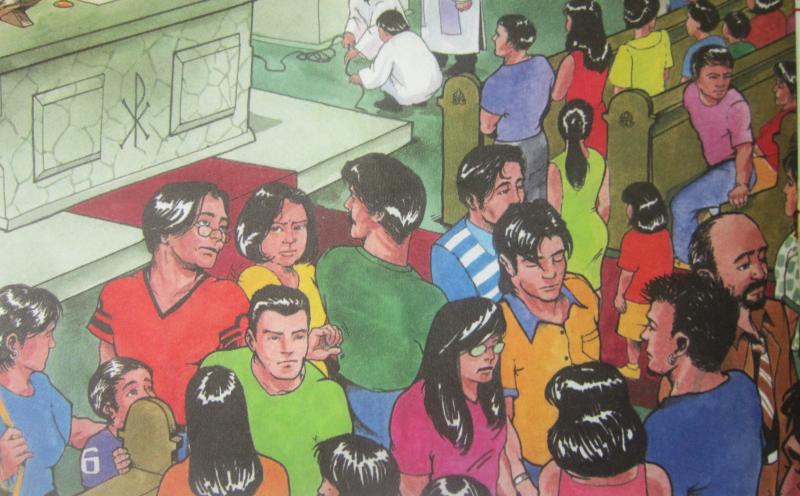Mission Brought Me Home
By Christine Ortaliz
Columban lay missionary Christine Ortaliz shares with us the challenge of adjusting to a new culture. We see something of the marvelous benefits of living for a period in a cross-cultural situation. It was during her stay in Taiwan that she finally came to grips with her own identity.

I came to Taiwan as a lay missionary in March 2000. Right now, I continue to study language and work for the migrant ministry at the Hope Worker’s Center in Taiwan. If you asked me one year ago if I would choose to work at the Center, I would have politely smiled and said “maybe”. But inside I would have been thinking, “No! That’s out of the question!”
Just a face in the crowd
When I first arrived in Taiwan, I started to attend the English Mass at the Hsinchu Cathedral in Chungli. The church was packed with hundreds of Filipinos sitting shoulder to shoulder, everyone sticking to each other with the help of Taiwan’s muggy weather. I felt a bit claustrophobic, almost like I was suffocating. I also grew a bit depressed because I looked just like everybody else: short stature and black hair. Even if I came to Mass 15 minutes early, I could barely make it through the main doors. “Excuse me, please,” I would say as I would weave my way through. Immediately people would stare at me and whisper to each other in Tagalog. That annoyed me. I cringed at the sound of Tagalog. I couldn’t understand any of it. Yet most of the songs were in Tagalog, not to mention everyone around me spoke it. I would feel frustrated and angry.
I felt like a sardine
Leaving the church would take a long time, too. Over 1,000 Filipinos would exit the church while about the same number would enter at the same time. I felt like one of those sardines – no space, no air, nowhere to move. Instead of finding peace, hope and renewal at the Sunday Masses, I found myself stressed and drained.
I then realized that I had many prejudices against the Filipinos and looked down on them.
I never knew where I came
Discovering my prejudices shocked me. I felt embarrassed, confused and ashamed. How could I possibly feel this way? My parents are both Filipino themselves! Furthermore, how could I be a missionary while holding all these prejudices?
Who am I?
My prejudices stemmed from my ignorance of my parents’ culture and my negative childhood experiences with it. My parents were the first generation to go to the States, so I was born and raised there. They never taught me to speak their dialect – Ilonggo, nor did they teach me to speak Tagalog. They never shared much about their own cultures and traditions. I don’t even recall hearing many stories about their childhood in the Philippines or their past.
As a child I had visited the Philippines once to visit my grandparents and relatives. I have never seen them since. I just remember I didn’t like the hot and sticky weather. So am I Filipino? Am I American? Am I Filipino-American? These questions are always up for debate not just among the Filipinos here, but among people I encounter in Taiwan.
Greater Understanding
Last year my ministry at the Hsinchu Cathedral provided an opportunity to meet many of the Filipino migrant workers and make a small group of friends. Little by little I began to understand that we had more similarities than just “Filipino” blood. Just like I did, they left everything to come to Taiwan – their country, their families and their friends. But they brought with them faith and hope, which we all shared when we worshiped every Sunday. Now I see them as my sisters and brothers. With a growing understanding, I slowly began to find that peace and renewal that I needed at the Mass.
Sunday lessons
Every Sunday for the past three months I have gone to the Hope Worker’s Center. When I can, I shadow some of the social workers to learn more about the different cases they are working on. I have held a few seminars and helped out at the Masses. I am not only learning about the situation of migrant workers in Taiwan and in Asia, I am also learning about the different cultures of the Indonesians, Thais, Filipinos and Vietnamese.
My time in Taiwan has challenged me in unexpected ways. When I learn more about the Filipino culture, I am also learning more about things my parents said and did that never made sense to me. They were Filipinos struggling to raise children in a culture different from their own – the American culture. I never thought my experience here would teach me about my own family’s history and the Filipino culture. These challenges and confrontations I face are not easy. But I believe I am slowly learning to love as Jesus loved – beyond all boundaries and conditions. This includes race and ethnicity.
What Mission is
For me, mission is a journey. Mission is healing. Mission is molding. Mission is freedom. Mission is bringing people together. Mission is discovering who I am. Will I ever be able to have to match the love Jesus had, enough to lay down my life for others no matter who they are? I have the hope that in the end, we all will be like Jesus (1 John 4:7) and love as He loved. Remembering this gives me strength and confidence.
Home to myself
Now when I hear the sound of Tagalog, I get a warm feeling. When we sing the Lord’s Prayer in Tagalog during Mass, I smile and take a brief moment to honor my parents, all relatives, ancestors and the Filipino brothers and sisters around me. I am happy, remembering that all the Filipinos are a part of me, a part of who I am.
